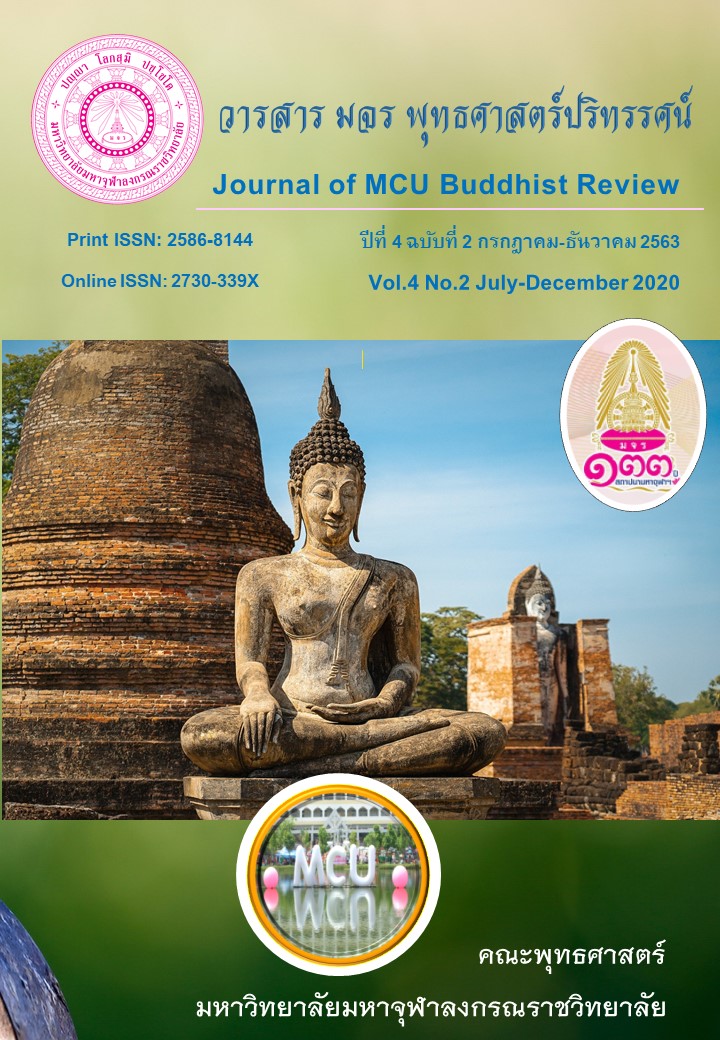การศึกษาความสอดคล้องเชาวน์อารมณ์ตามแนวคิดของแดเนี่ยล โกลแมน กับพระพุทธศาสนาเถรวาท
Main Article Content
บทคัดย่อ
จากการศึกษาพบว่า เชาวน์อารมณ์ของแดเนี่ยล โกลแมนหมายถึง ความสามารถในการตระหนักรู้ถึงความรู้สึกของตนเองและผู้อื่น สามารถจูงใจ และจัดการกับอารมณ์ของตนเองและผู้อื่น และมีสัมพันธภาพกับผู้อื่นได้เป็นอย่างดี นอกจากนั้นได้แบ่งองค์ประกอบของเชาวน์อารมณ์เป็น 5 องค์ประกอบใหญ่ ดังนี้คือ การตระหนักรู้ในตน การบริหารจัดการกับอารมณ์ของตน การจูงใจตนเอง การรู้จักสังเกตความรู้สึกของผู้อื่น การดำเนินการด้านความสัมพันธ์กับผู้อื่น
เชาวน์อารมณ์ในพระพุทธศาสนา หมายถึง ปัญญา มีความตระหนักรู้เท่าทันต่อสิ่งเร้าที่มากระทบตามความเป็นจริง สามารถควบคุมอารมณ์ ความรู้สึกนึกคิดของตนและผู้อื่น อยู่ร่วมกับผู้อื่นอย่างมีความสุข แสดงพฤติกรรมที่ถูกต้อง ดีงาม องค์ประกอบของเชาวน์อารมณ์จึงเป็นสภาพจิตที่ดี เป็นกุศล ประกอบด้วยหลักธรรมที่สำคัญๆ ในพระพุทธศาสนา เช่น สติปัฏฐาน 4 อิทธิบาท 4 หิริโอตตัปปะ พรหมวิหาร 4 เป็นต้น
ในส่วนของความสอดคล้องแนวคิดเชาวน์อารมณ์ในทัศนะของ Daniel Goleman กับพระพุทธศาสนานั้นมีความสอดคล้องทั้ง 2 ด้าน ดังนี้ 1) ด้านความหมาย เป็นปัญญาตระหนักรู้เหมือนกันแต่ปัญญาของ Goleman นั้นเป็นปัญญาในการดำเนินชีวิตที่เรียกว่า โลกียปัญญา ส่วนปัญญาในพระพุทธศาสนามีโลกียปัญญาเป็นพื้นฐานสู่ความหลุดพ้น มีอิสรภาพ ที่เรียกว่า โลกุตตร-ปัญญา 2) ด้านองค์ประกอบ องค์ประกอบเชาวน์อารมณ์ตามทัศนะของ Golemanนั้นประกอบด้วยหลักธรรมในพระพุทธศาสนา
Article Details
- บทความที่ได้รับการตีพิมพ์เป็นลิขสิทธิ์ของวารสาร มจร พุทธศาสตร์ปริทรรศน์
- ข้อความใดๆ ที่ปรากฎในบทความที่ได้รับการตีพิมพ์ในวารสาร ถือเป็นความรับผิดชอบของผู้เขียนบทความ และข้อคิดเห็นนั้นไม่ถือว่าเป็นทัศนะและความรับผิดชอบของกองบรรณาธิการวารสาร มจร พุทธศาสตร์ปริทรรศน์
เอกสารอ้างอิง
กระทรวงศึกษาธิการ กรมวิชาการ.(2545). พัฒนาวุฒิภาวะทางอารมณ์ ศีลธรรมและจริยธรรม ฉบับที่ 3 สร้างลูกให้เติบใหญ่มีวุฒิภาวะทางอารมณ์ ศีลธรรมและจริยธรรมได้อย่างไร. กรุงเทพมหานคร : โรงพิมพ์คุรุสภา ลาดพร้าว.
จำลอง ดิษยวนิช. (2553). “ความฉลาดทางอารมณ์กับสติปัฏฐานสี่”. วารสารพุทธศาสตร์ศึกษา ปีที่ 4 ฉบับที่ 1 (ตุลาคม– ธันวาคม) : 9.
เทอดศักดิ์ เดชคง. (2546). ความฉลาดทางอารมณ์จากทฤษฎีสู่การปฏิบัติ, พิมพ์ครั้งที่ 2.กรุงเทพมหานคร: สำนักพิมพ์มติชน.
พระธรรมปิฏก (ป.อ. ปยุตโต). (2545). “เจตโกศลหรือปรีชาเชิงอารมณ์”. รวมบทความทางวิชาการเรื่อง อีคิว. พิมพ์ครั้งที่ 4. กรุงเทพมหานคร : DESKTOP.
พระพรหมคุณาภรณ์ (ป.อ. ปยุตฺโต). (2553). พจนานุกรมพุทธศาสน์ ฉบับประมวลศัพท์. พิมพ์ครั้งที่ 15. กรุงเทพมหานคร : โรงพิมพ์ บริษัท สหธรรมิก จำกัด.
พระมหานิพนธ์ สุขอ้วน. (2548). “สมาธิตามหลักพระพุทธศาสนากับความฉลาดทางอารมณ์ของเยาวชนกรุงเทพมหานครในปัจจุบัน”. วิทยานิพนธ์ศิลปศาสตรมหาบัณฑิต. คณะศิลปศาตร์ มหาวิทยาลัยธรรมศาสตร์.
พระพรหมคุณาภรณ์ (ป.อ. ปยุตฺโต).(2555). พุทธธรรม ฉบับปรับขยาย, พิมพ์ครั้งที่ 32 (กรุงเทพมหานคร : สำนักพิมพ์ผลิธัมม์.
พุทธทาสภิกขุ. (2554). ผลของจิตตภาวนาคือ นิพพาน. กรุงเทพมหานคร : บริษัท ตถาตา พับลิเคชั่น จำกัด.
มหาจุฬาลงกรณราชวิทยาลัย. (2539). พระไตรปิฎกภาษาไทย ฉบับมหาจุฬาลงกรณราชวิทยาลัย.กรุงเทพมหานคร : โรงพิมพ์มหาจุฬาลงกรณราชวิทยาลัย.
มหามกุฎราชวิทยาลัย.(2535). อภิธัมมัตถสังคหบาลีและอภิธัมมัตถวิภาวินีฎีกาฉบับแปลเป็นภาษาไทย. พิมพ์ครั้งที่ 5. กรุงเทพมหานคร : โรงพิมพ์มหามกุฎราชวิทยาลัย.
รินธรรม อโศกตระกูล และคณะ. (2549). “ปัจจัยสนับสนุนการเปลี่ยนแปลงพฤติกรรมของพุทธศาสนิกชน”. งานวิจัย. ศูนย์ส่งเสริมและพัฒนาพลังแผ่นดินเชิงคุณธรรม.
ศันสนีย์ วรรณางกูร.(2545). EQ ของคุณเป็นอย่างไร. พิมพ์ครั้งที่ 3. กรุงเทพมหานคร : สำนักพิมพ์ มติชน จำกัด.
Bar-on. (1997). The Emotional Quotient Inventory (EQ-I) Technical Manual Toronto. Canada: Multi-Health system.Cooper, R.K. And A. Sawof. (1997). Executive EQ intelligence in leadership and Organization.
New York: Grosst/ Put nam.
Daniel Goleman. (2006). Working with Emotional Intelligence. New York: Bantam Books.
_____________. (2006). Emotional Intelligence & Working with emotional intelligence. New York: Bantam Books.
Damien Keown. (2003). A Dictionary of Buddhism. New York: Oxford University Press.
Emotional Intelligence. (2006). Why it can matter more than IQ Bantam. 10th anniversary reissue edition. New York: Bantam Books.
THE DALAI LAMA. (1991). Mind Science: AN EAST-WEST DIALOGUE. Massachusetts: Wisdom Publications.
Mayer, J. D., and Salovey, P. (1997). “What is emotional intelligence?”. Emotional development and emotional intelligence: Implications for educators. Edited by D. J. Sluyter. New York: Basic Books.


